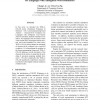Free Online Productivity Tools
i2Speak
i2Symbol
i2OCR
iTex2Img
iWeb2Print
iWeb2Shot
i2Type
iPdf2Split
iPdf2Merge
i2Bopomofo
i2Arabic
i2Style
i2Image
i2PDF
iLatex2Rtf
Sci2ools
ACL
2012
2012
Character-Level Machine Translation Evaluation for Languages with Ambiguous Word Boundaries
In this work, we introduce the TESLACELAB metric (Translation Evaluation of Sentences with Linear-programming-based Analysis – Character-level Evaluation for Languages with Ambiguous word Boundaries) for automatic machine translation evaluation. For languages such as Chinese where words usually have meaningful internal structure and word boundaries are often fuzzy, TESLA-CELAB acknowledges the advantage of character-level evaluation over word-level evaluation. By reformulating the problem in the linear programming framework, TESLACELAB addresses several drawbacks of the character-level metrics, in particular the modeling of synonyms spanning multiple characters. We show empirically that TESLACELAB significantly outperforms characterlevel BLEU in the English-Chinese translation evaluation tasks.
ACL 2012 | Automatic Machine Translation | Computational Linguistics | English Chinese Translation | Level Metrics |
Related Content
| Added | 29 Sep 2012 |
| Updated | 29 Sep 2012 |
| Type | Journal |
| Year | 2012 |
| Where | ACL |
| Authors | Chang Liu, Hwee Tou Ng |
Comments (0)

